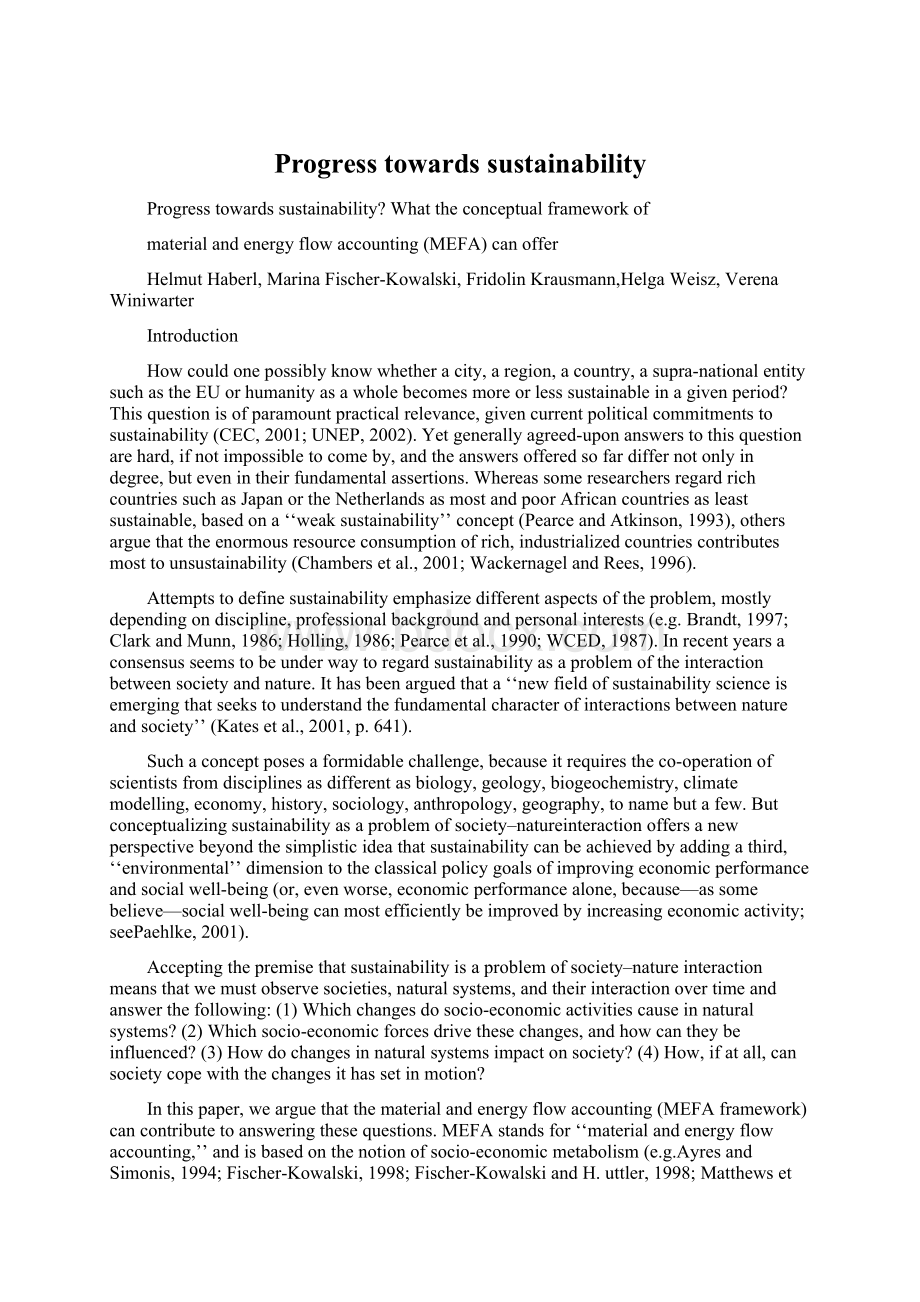Progress towards sustainabilityWord格式文档下载.docx
《Progress towards sustainabilityWord格式文档下载.docx》由会员分享,可在线阅读,更多相关《Progress towards sustainabilityWord格式文档下载.docx(16页珍藏版)》请在冰豆网上搜索。

HelmutHaberl,MarinaFischer-Kowalski,FridolinKrausmann,HelgaWeisz,VerenaWiniwarter
Introduction
Howcouldonepossiblyknowwhetheracity,aregion,acountry,asupra-nationalentitysuchastheEUorhumanityasawholebecomesmoreorlesssustainableinagivenperiod?
Thisquestionisofparamountpracticalrelevance,givencurrentpoliticalcommitmentstosustainability(CEC,2001;
UNEP,2002).Yetgenerallyagreed-uponanswerstothisquestionarehard,ifnotimpossibletocomeby,andtheanswersofferedsofardiffernotonlyindegree,butevenintheirfundamentalassertions.WhereassomeresearchersregardrichcountriessuchasJapanortheNetherlandsasmostandpoorAfricancountriesasleastsustainable,basedona‘‘weaksustainability’’concept(PearceandAtkinson,1993),othersarguethattheenormousresourceconsumptionofrich,industrializedcountriescontributesmosttounsustainability(Chambersetal.,2001;
WackernagelandRees,1996).
Attemptstodefinesustainabilityemphasizedifferentaspectsoftheproblem,mostlydependingondiscipline,professionalbackgroundandpersonalinterests(e.g.Brandt,1997;
ClarkandMunn,1986;
Holling,1986;
Pearceetal.,1990;
WCED,1987).Inrecentyearsaconsensusseemstobeunderwaytoregardsustainabilityasaproblemoftheinteractionbetweensocietyandnature.Ithasbeenarguedthata‘‘newfieldofsustainabilityscienceisemergingthatseekstounderstandthefundamentalcharacterofinteractionsbetweennatureandsociety’’(Katesetal.,2001,p.641).
Suchaconceptposesaformidablechallenge,becauseitrequirestheco-operationofscientistsfromdisciplinesasdifferentasbiology,geology,biogeochemistry,climatemodelling,economy,history,sociology,anthropology,geography,tonamebutafew.Butconceptualizingsustainabilityasaproblemofsociety–natureinteractionoffersanewperspectivebeyondthesimplisticideathatsustainabilitycanbeachievedbyaddingathird,‘‘environmental’’dimensiontotheclassicalpolicygoalsofimprovingeconomicperformanceandsocialwell-being(or,evenworse,economicperformancealone,because—assomebelieve—socialwell-beingcanmostefficientlybeimprovedbyincreasingeconomicactivity;
seePaehlke,2001).
Acceptingthepremisethatsustainabilityisaproblemofsociety–natureinteractionmeansthatwemustobservesocieties,naturalsystems,andtheirinteractionovertimeandanswerthefollowing:
(1)Whichchangesdosocio-economicactivitiescauseinnaturalsystems?
(2)Whichsocio-economicforcesdrivethesechanges,andhowcantheybeinfluenced?
(3)Howdochangesinnaturalsystemsimpactonsociety?
(4)How,ifatall,cansocietycopewiththechangesithassetinmotion?
Inthispaper,wearguethatthematerialandenergyflowaccounting(MEFAframework)cancontributetoansweringthesequestions.MEFAstandsfor‘‘materialandenergyflowaccounting,’’andisbasedonthenotionofsocio-economicmetabolism(e.g.AyresandSimonis,1994;
Fischer-Kowalski,1998;
Fischer-KowalskiandH.uttler,1998;
Matthewsetal.,2000).TheMEFAframeworkanalysesimportantaspectsofsociety–natureinteractionbytracingsocio-economicmaterialsandenergyflowsandbyassessingchangesinrelevantpatternsandprocessesinecosystemsrelatedtotheseflows—inotherwords,the‘‘colonization’’ofterrestrialecosystems(Haberletal.,2001b).Theconceptof‘colonization’referstosocio-economicinterventionsintonaturalsystemsthatactivelyseektoincreasetheutilityofthesesystemsforsocio-economicpurposes(Weiszetal.,2001).
Knowinghowmaterialandenergyflowsarerelatedtoeconomicactivityortosocialwell-beingwouldgreatlyenhanceourunderstandingofsocio-economicdrivingforcesofenvironmentalchangeaswellasourabilitytochangeourbehaviour.A‘‘physicaleconomy’’conceptcouldmakeiteasiertoevaluatethesocio-economicsignificanceofchangesintheenvironment.Moreover,understandingdeliberatechangesinnaturalsystemsnotas‘‘disturbance,’’butascolonizationemphasizestheirsocialandeconomicsignificance.
Conceptualizingsustainability
Sustainability,stability,andchange
Biogeochemical,paleoecologicalandgeophysicalresearchintotheEarth’shistoryprovidesampleevidencethatnaturalsystemsundergopervasivechangesnaturally.Globalaveragetemperature,precipitationpatterns,sealevel,atmosphericchemistryandbiodiversityhavefluctuateddrastically,drivenbybothendogenous(e.g.geologicalorbioticprocesses)andexogenous(e.g.
meteoriteimpacts)phenomena(Schellnhuber,1999;
Schlesinger,1997).Naturalsystemsare,therefore,bestconceivedofasself-organizingdynamicsystemswhichmayreachequilibriumstatesforlimitedperiods,butmayaswellundergorapidtransitionsbetweendifferentmoreorlessstableequilibriumstates(Holling,1986;
Schefferetal.,2001).Therefore,itseemshardlyarguablethatsustainabilityshouldimplythemaintenanceoflong-termequilibriuminnaturalsystems—suchanequilibriumhasneverexisted,norwillitexistinthefuture.
Sustainabilityisaboutmeetingtheneedsofthepresentwithoutcompromisingtheabilityoffuturegenerationstomeettheirneeds(WCED,1987);
itstressestheneedforamoreequitabledistributionofresourcesbetweenregionsandwithinnations(UNEP,2002),anditrefersto‘‘creatingandmaintainingouroptionsforprosperoussocialandeconomicdevelopment’’(Folkeetal.,2002,p.3).Sustainability,therefore,isananthropocentricnotion:
itmeansthathumaninducedchangesinecosystemsmustnotthreatentheexchangeprocessesbetweensocietyanditsnaturalenvironmentinwaysthataffectsociety’ssurvivalorwell-being.Observingsustainability,therefore,mustincludetheanalysisofsociety’sbehaviourtowardsitsnaturalenvironmentonmanyspatialandtemporalscales.
If,however,equilibriumisanunattainablegoal,whatcouldsustainabilitymean?
Somestresstheneedto‘‘expecttheunexpected’’(Holling,1986)andimprovesociety’sabilitytocopewithuncertaintyandsurprise,efinedasasituationinwhichperceivedrealitydepartsqualitativelyfromexpectation(BerkesandFolke,1998,p.6).Thishasledtoadefinitionofsustainabilityas‘‘thecapacitytocreate,test,andmaintainadaptivecapability’’(Holling,2001,p.390)or,inotherwords,astheresilienceofsocial-ecologicalsystems(Carpenteretal.,2001).However,compellingproposalsfortransformingtheseideasintomeasurableindicatorsthatwouldbeusefulforpolicy-makinghavenotyetbeenbroughtforward.
Othersarguethatsustainabilityimplies‘‘livingwithintheregenerativecapacityofthebiosphere’’(Wackernageletal.,2002,p.9266),ormaintainingnaturalcapital(WackernagelandRees,1996).Butneithertheregenerativecapacityofthebiospherenornaturalcapitalcan,atpresent,bemeasuredappropriately.Monetaryvaluationoftheworld’secosystemservicesandnatural
capital(Costanzaetal.,1997),howeverusefultheymaybetodemonstratetheeconomicvalueoftheseassets,isinsufficienttocapturethefullsignificanceofnaturalcapitalforlifesupport.Measuringthelivingpartofnaturalcapitalas‘‘globalhectares’’withstandardizedbioproductivity(Wackernageletal.,2002;
Monfredaetal.,2004)isusefulinordertoconceptualisesomeaspectsofnaturalcapital,mainlybiomassproductionandcarbonsequestration,butinevitablyneglectsotheraspectssuchaswatersupplyornutrientcycling.Social-ecologicalsystemsandsustainability
Sustainability(orunsustainability)isanattributeofa‘‘social-ecologicalsystem.’’Asocial-ecologicalsystememergesthroughtheinteractionofasocietywithitsnaturalenvironment.Somehavedefinedsocial-ecologicalsystemasanecosystem‘‘thatdoesexplicitlyincludehumansor,morespecifically,thesocialsystem’’(BerkesandFolke,1998,p.9;
emphasisbytheauthors).Thisformulation,however,couldbemisleadingbecauseitimpliesthatsocietycanbeseensimplyasasubsystemoftheecosystem.Suchaviewisinappropriatebecause
societycannotbereducedtoitsbiophysicalaspects.
Althoughsocietiesareessentiallydependentonmaterialandenergy,theyhaveemergentpropertiesthatcannotbefullyunderstoodbyanalysingthebiophysicalstructuressustainingthem.Thus,societyinitsentiretycannotberegardedasasubsystemofanecosystem.Thisisexpressedinthesociologicalprincipletoregardthesocialasareality‘‘suigeneris.’’Ontheotherhandhumanitiesandthesocialsciencestendtoconceptualisesocietyandunderestimatetherelevanceofbiophysicalaspects,orevenneglectthemaltogether(e.g.Luhmann,1995).Forsustainabilityresearch,however,neitherthenaturalisticviewofecologynortheculturalistic
perspectiveofthesocialsciencesandhumanitieswillsuffice.
Inanattempttoforgeanotionofsocietythatismoreusefulforsustainabilityresearch,Weiszetal.(2001,p.121)haveproposedto‘‘lookuponsocietyasahybridoftherealmofculture,ofmeaning,ofcommunication,andofthenaturalworld.Inourunderstanding,society
comprisesaculturalsystem,asasystemofrecurrentself-referentialcommunication,andmaterialcomponents,namely,acertainhumanpopulationaswellasaphysicalinfrastructuresuchasbuildings,machines,artefactsinuse,andanimallivestock’’,whichintheirentiretycanbedenotedas‘‘biophysicalstructuresofsociety.’’
Basedonsuchanotionofsociety,social-ecologicalsystemscanbedefined,asshowninFig.1,ascomprisinga‘‘natural’’or‘‘biophysical’’sphereofcausationgovernedbynaturalla